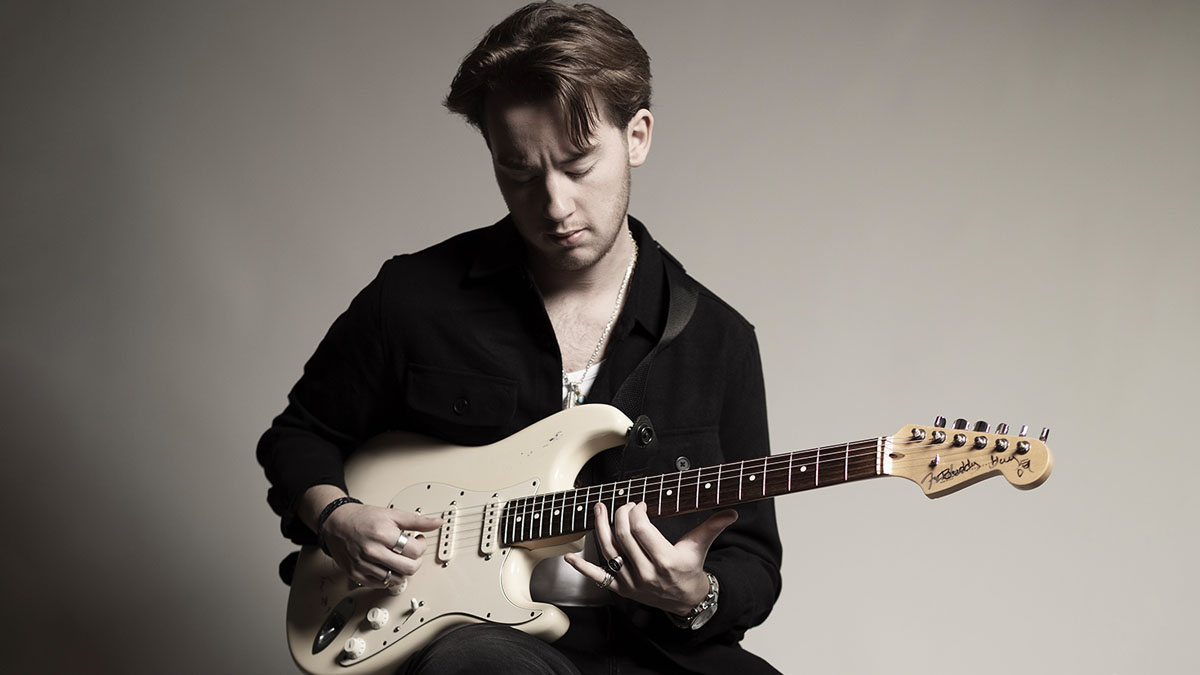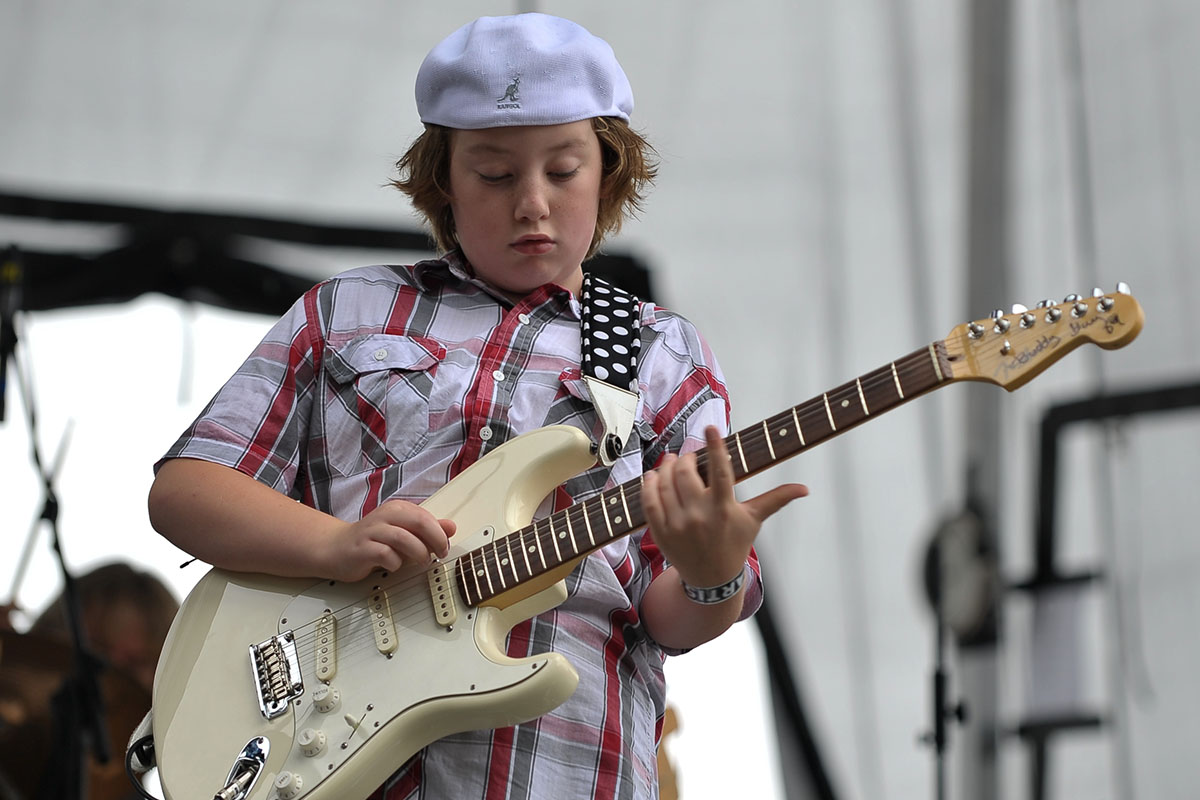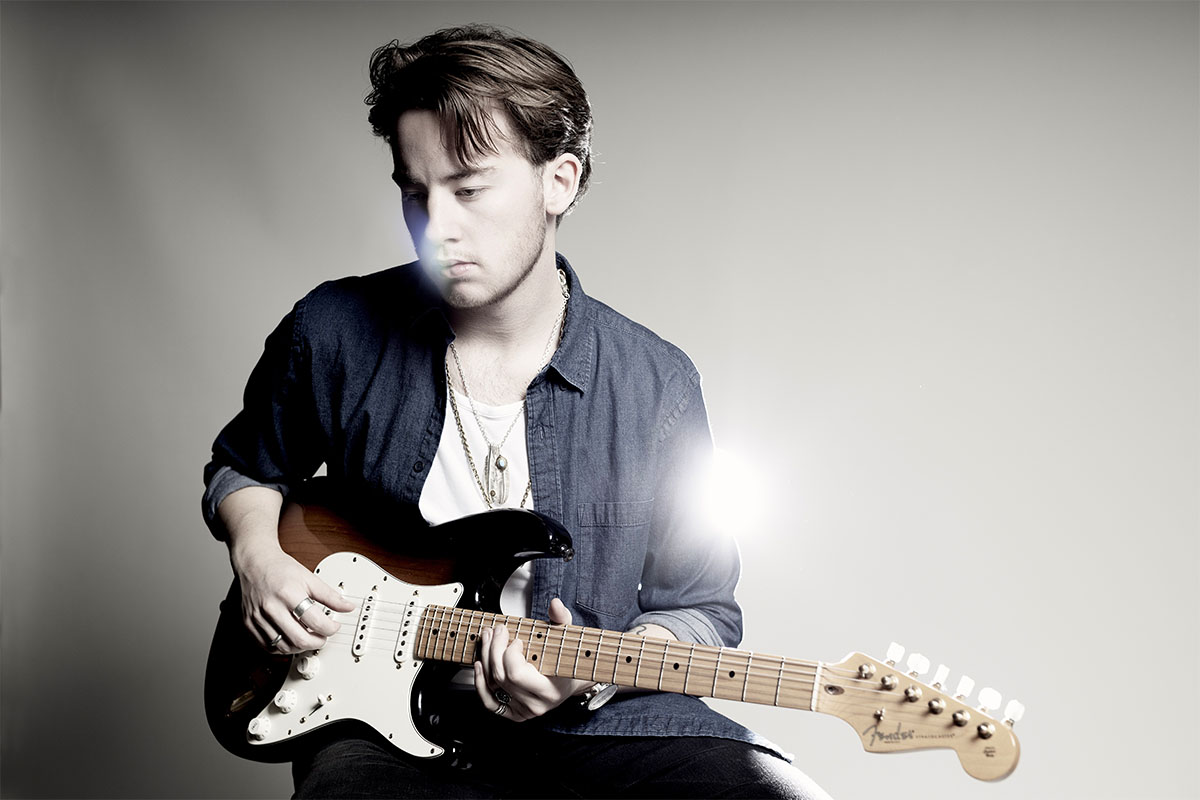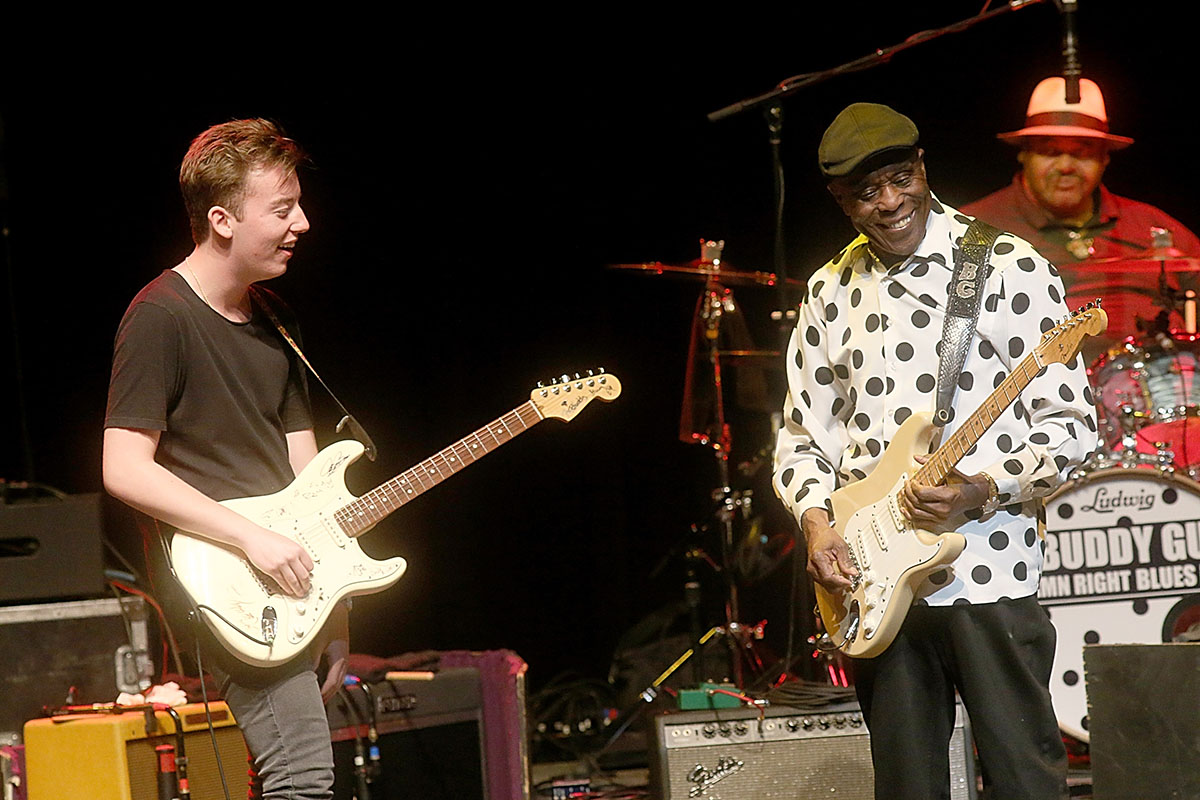Quinn Sullivan: “You pick up a ’59 Les Paul and it just speaks differently to any other guitar you have ever played before – it is a beast of its own“
Buddy Guy's protégé returns with an album of huge pop hooks, exemplary blues-rock chops and super-premium vintage guitar tone

Want all the hottest music and gear news, reviews, deals, features and more, direct to your inbox? Sign up here.
You are now subscribed
Your newsletter sign-up was successful
Quinn Sullivan's fourth album, Wide Awake, offers a veritable tasting menu of electric guitar tone but that's not what he wants you to notice. At least not at first. Songwriting is a little like being a chef. You want people to enjoy the meal. They can ask about the ingredients afterwards.
A child prodigy who was first onstage aged five, performing on TV with Ellen DeGeneres aged six, and jamming with Buddy Guy aged eight, Sullivan is all-in when it comes to gear worship, tone-hunting and, when the occasion calls for it, lighting up the fretboard. But as he explains, it's got to be the song first.
When you consider that he was tracking Wide Awake at producer Oliver Leiber's studio in Los Angeles surrounded by a cornucopia of vintage guitars, amplifiers and effects – a collection that included some Holy Grail pieces such as a Dumble Overdrive Special – that takes the self-discipline of a monk.
Sullivan plays around with genre. He was weaned on the Beatles, absorbed the Laurel Canyon sound like a sponge, and still had his milk teeth when he made his bones playing blues with Buddy Guy. All of that comes to the fore on Wide Awake. In a similar fashion to John Mayer, he uses sleight of hand to secret guitar virtuosity and Michelin-starred tone into a pop-rock mélange of blues, rock, soul, funk and RnB.
Playing the guitar has always been the backbone of what I do, almost like my safe haven
“I just focus on writing the song, on getting the words ready to go, on getting the melody,“ he explains. “Those two things are the most important part of the song – having a really great melody and also having a great lyric to follow that melody. It’s like if you can bridge those to things together, that’s like the golden ticket that everybody’s searching for.“
Once you've got the golden ticket, well, you can do anything... That's when you can ask to use the Dumble.
Wide Awake really does sound like a summer record. Was that something you were conscious of when writing it?
Want all the hottest music and gear news, reviews, deals, features and more, direct to your inbox? Sign up here.
“Thank you for saying that. I probably wasn’t conscious of it but making an album in LA, it is just so nice out all the time. The weather is always perfect. I think that must have rubbed off on the songs and what I was writing about, and how the songs were sounding.
“I was just in that writing mode for so long, and I was out there, soaking up the LA. Definitely, that had a lot to do with the sound of the album.”
Do you have a philosophy for where your guitar should sit in your songwriting, because some are driven by the guitar, in others it takes a back seat.
“Yeah, absolutely. I agree with that. When I am writing songs and I am collaborating with people, I am not necessarily thinking about the guitar solo or what I am going to be playing on it. I guess, on this album, the guitar – you’re right – the guitar is taking sort of a back seat, but, at the same time, I’ve been able to keep it at the forefront of what I do, because guitar is so important to me.
I was happy to be able to have the guitar still be a big part of the sound. But it is more about the song and trying to write songs that could be memorable
“Playing the guitar has always been the backbone of what I do, almost like my safe haven. And with this new music, the songs and the melodies and the lyrics, definitely feel more important than the guitar solos, but there are some good guitar moments on this album that I was digging in on.
“We had all the songs written and we were tracking the record and I would go in and overdub these solos and really try to make them as good as I could make them. I was happy to be able to have the guitar still be a big part of the sound. But like you said, it is more about the song and trying to write songs that could be memorable. Every songwriter’s goal is to do that. That’s what I am always striving to do.”
You open the record with All Around The World, and the riff drives the song, and the guitar tone is amazing, but it doesn’t overpower that sort of Carly Simon-esque melody.
“Yeah! Thank you. I am a huge fan of that 70s Laurel Canyon sound. Joni Mitchell, James Taylor, Carly Simon, Carole King, all those artists were so important to music, so I am always influenced by that sound.”
Laurel Canyon was a golden era. All those artists seemed to share a certain sensibility and aesthetic outlook, yet no two sounded alike.
“Yeah, and also I feel like it was just that time when that music was being made. It was a a special time for the world. There were so many things going on. Socially, it was so much different to how it is now, and those artists were definitely being influenced by American music, roots music, blues music, soul music, that was all seeping into what they were writing. I think they sort of took the Beatles and the Beach Boys and stuff, and they put all of those elements together and made it their own.
“I would almost like to say I was born in the wrong era, because I love that music so much. I love a lot of new music as well, but I always go [back]. My home place for music is definitely that kind of music from the early to mid 60s and 70s. That’s really where I draw from. That’s my drawing board when I am writing music. I always go back to that stuff.”

How important were the Beatles for you?
“They were so instrumental in my musical life. Growing up, I remember the first ever CD I got was the Beatles number one hits album, the red album with the yellow number one. That was the first ever album that I ever got, and I think it is the perfect introduction to music for anybody, because it has all of their greatest hits on it – obviously! – and everything that they did was the best of them.
“I later found out that everything they did was the best, but this was like their number one hits and their most-famous work, I guess. I remember listening to them millions of times and just being enthralled, and just being mesmerised.
“Those melodies resonated with me at three-years-old but they also resonate with me at 22-years-old. It’s timeless music that anybody at some point in their life has heard once. I think that’s the true testament to what the Beatles did with music and how they were able to make timeless music without even knowing that they were making timeless music.
“At the time when they were making this music, I don’t think they were even aware they were making music that was going to last for many lifetimes. I still listen to it now, and like I said, when I go to write a song, when I go to write a melody, or even if I am just playing a guitar solo for something, I always get influenced by that.”
You’ve been doing this this you were a child, and it must be second nature by now, but how do you approach your performance, because it is very different thing to playing?
“Yeah, it’s a different animal. It is a different part of your brain. I am lucky that I have been performing live since I was five years old. My first show ever was probably at five, somewhere locally, and I was actually onstage playing alongside this kids band I used to go see every week, playing Mondays at the local zoo. I would not be interested in playing with the kids. I’d be interested in playing with the band, and so they’d have me onstage. I wasn’t plugged in or anything but I had my acoustic guitar strumming along.
“I always liked being in front of people playing, and what’s funny about that is I don’t like to play in front of six people at a party. That makes me way more uncomfortable than playing in front of 5,000 people at a venue somewhere. I guess that’s just because I don’t know any of them in the crowd so it is just easier to be a performer and not really care how people perceive you.
“It’s like, ‘Well, I don’t know you so I am just going to do what I do.’ But when you are at a party or a smaller gathering of some sort, and you are around everybody that you know, and everybody is looking at you and expecting you to play. That’s definitely a bit more uncomfortable for me. I have been doing this for so long, and I have been at this for a good period of my life doing it professionally, now it feels more natural to me, to just go do it and play live.“
Sure. The studio is different again. That's more of an intellectual endeavour.
“When you are doing something in a studio, you are in a completely different headspace as you are when playing live. You are working a different part of yourself. In the studio, I notice that I am thinking a lot more. I am doing a lot more overthinking – perfectionist thinking – and when I am playing live it is almost the total opposite.
A lot of people ask me, ‘What are you thinking about when you are playing onstage? What’s going through your head?’ Not much! It’s really just a stream of consciousness
“I am not thinking anything and it’s pretty much a stream of consciousness. A lot of people ask me, ‘What are you thinking about when you are playing onstage? What’s going through your head?’ Not much! It’s really just a stream of consciousness. I am really just trying to be in the moment, and be with whoever I am playing in front of and making sure that I am doing the best I can be doing.”

The guitar tones on this record are phenomenal. What were you using?
“Thanks, man! We had a ton of cool stuff. I was in Oliver’s home studio, and Oliver is actually a guitar collector. He has a huge array of guitars and effects pedals and amps, and I was able to pick whatever I wanted and everything was pretty much open to play – for All Around The World, I used a sunburst ’59 Les Paul. That guitar is just... I mean, you pick up one of those and it just speaks differently to any other guitar you have ever played before.
“It is a beast of its own. It has just got this amazing sound to it that I don’t think any other guitar has, and it was really cool to play it as a guitar player and a fan of guitars. It was really cool to sit down with that thing and mess around and play it.“
I got to use the famous Dumble Overdrive Special on a couple of songs – that, as a guitar player, just freaked me out
“But I used a bunch of different guitars. I used a bunch of old vintage guitars, early 60s, late 50s Strats. I used a couple of early 50s Telecasters and Nocasters. I used a Jazzmaster from the mid-60s on a couple of the rhythm tracks. I used a ’65 Epiphone Casino on some songs, and I used a mid-90s Jimi Hendrix Strat on a few songs as well. And of course a bunch of old Fender amps and old Marshall amps.
“I actually got to use the famous Dumble Overdrive Special on a couple of songs – that, as a guitar player, just freaked me out. I was totally in my glory for that moment! It was incredible. I used a lot, a lot of cool guitars on this album.”

These ’59 Les Pauls almost have a cult of personality around them. Did that ‘Burst have a name?
“I don’t know if he named this one but I remember it being in really good condition. And y’know, I actually got to use a ’58 Flying V as well. That was another one that was part of my goals as a guitar player, to try these guitars out. That was on the list for me. But I don’t think Oliver names his guitars. That would be funny.”
How did you get that hot overdrive sound on Wide Awake? That’s a wonderful sound.
“Thanks! That was cool. We were actually going for a Neil Young sound on that song, a Crazy Horse kinda vibe, and I remember using a Tweed 50s Twin and an old Gibson amp, and we had them going together at the same time, and I don’t even think I used any effects on the rhythm sound. That was amps and guitar, turned all the way up.
“We had the amps going in another room in another room in the studio, so we weren’t getting our ears blasted. We had it coming through the speakers in the studio. For the solo, that was an octave fuzz of some sort. I forget the name of the pedal but it was some sort of vintage fuzz pedals from 60s with an Octavia kind of sound to it.
“I just plugged one of those in and ran that really hot, and for the solo on that I am using the ’58 Flying V. I am playing a Flying V on the solo and I am playing a Guild hollowbody on the rhythm sound. Tone-wise, that’s definitely my proudest tone moment on that song.”
Yes, it’s incredible. Also, we should talk about the Strawberry Rain tone as well. That sounds like the Hendrix Strat.
“It was! It was! Good guess. That was the Hendrix Strat, and Oliver actually has a designated Jimi Hendrix pedalboard that we powered up and plugged in. He’s got the original Uni-Vibe, he’s got an original Fuzz-Wah, which is super rare. I played that.
“The wah-wah sound you hear on that is a Fuzz-Wah, a fuzz pedal that’s a wah-wah at the same time. It does this really cool fuzz thing. We used one of those, maybe a Uni-Vibe going through that at the same time, and we did the classic Hendrix, Marshall Super Lead tone! We went super-Hendrix on it, but like, when in Rome… [Laughs] You gotta do the Hendrix thing!”
Oliver actually has a designated Jimi Hendrix pedalboard... We did the classic Hendrix, Marshall Super Lead tone! We went super-Hendrix on it
Brilliant. This record sounds like it was a lot of fun to make. It is funny how things are inverted these days. In the past, the stage was where volume would be used as this creative dynamic, and now it’s in the studio, with you gunning amps in a separate room and letting the volume loose. It’s so inspiring but we’re not allowed to do that live anymore.
“That’s very true. I agree, man. When I am playing live, normally when I am doing shows I’ll use a Deluxe Reverb or a Vibrolux. I am kind of a one-amp guy when I am playing live. I haven’t really done the whole monstrous rigs, with the 100-watt amps or anything like that, because I kind of realised most of what I am doing right now, a lot of small clubs and festivals, I don’t really need anything that is overpowering for anyone. And I am sure the sound guys are perfectly okay with that. [Laughs]
“When you think about the 60s and you think about when people saw Cream and Hendrix, and the Who, and all these old bands that did bring the huge Marshall stacks, I can only imagine the sound and the PA systems weren’t as powerful as they are now, so they probably needed that heavy volume to get it out to the crowd.
“Nowadays, you can do that with smaller amps and still having it being loud and present but not necessarily having that huge rig that you have to carry around everywhere. It has been nice for me. Though you if you ask me in five years, I am sure I will have a completely different answer for you.”
Totally. But that’s the thing, you could play Giants Stadium with a Fender Deluxe Reverb and a mic in front of it. Also, if you come with Marshall stacks, that brings with it a certain expectation.
“Yeah, absolutely. When you go to see a show and you’re in the audience, and you are seeing a huge two-cabinet Marshall stack you are expecting the show to be pretty loud, and if it’s not it’s like, ‘What are you doing, man!?’ [Laughs]”
Do you write your solos out before or let it rip?
“For this album, I kind of played every solo a bunch of times to get it working, to figure it out. That’s what I like to do. I would pretty much tell Oliver – especially when doing solos – ‘Let me do a few passes on my own and just let my brain figure out what I want to do on this.’ Also, he was really good, too, at helping me craft some of the solos.
“But then some of them are just natural. A few solos that come to mind that were kinda like one or two and done were for songs like How Many Tears or songs like Jessica, She’s Gone, songs that I did one the first or second take, and then there were a few that took a bit longer.
My favourite solos on the album are always the ones that didn’t take me a long time to do, or that I really had to think about
“I like to go in and do it a few times and then micromanage it. My favourite solos on the album are always the ones that didn’t take me a long time to do, or that I really had to think about. They come out of you naturally.
“That solo you hear on All Around The World was actually a demo solo I played and was going to redo it when we tracked the song, but we realised that the demo solo, the tone was so cool, and I think I just played it the way I played it without thinking about it too much, and that was the solo we ended up picking. I tried many other times and we just kept coming back to the demo solo.”
Sometimes all you need is to know what note to start on and which to finish on.
“Absolutely.”

We can’t let you go without asking you about Buddy Guy. What was the biggest lesson you took from playing with him?
“Y’know, I think for me the best lesson that I ever learned from Buddy was just, when you are onstage, give it 110 per cent of what you have every night, whether you are not in the best mood or whatever, it doesn’t really matter the circumstances. When you get onstage you leave everything that happened in the day behind you. For an hour-and-a-half you just give it your all.
“You have to have be conscious that people paid to come see you, and they want to see a really great show, and you have to put that one for them. I’ve seen Buddy do that for 10 years of my life. As far as lessons go, that would be number one.”
And you do right by the crowd you do right by yourself. Clearing the head, performing, it’s good for you.
“Yeah, man! It’s a great way to relieve stress. For me, playing live is like a therapy session. It’s the best way I know how to express how I feel, through playing, through singing.”
- Wide Awake is out now via Provogue.
Jonathan Horsley has been writing about guitars and guitar culture since 2005, playing them since 1990, and regularly contributes to MusicRadar, Total Guitar and Guitar World. He uses Jazz III nylon picks, 10s during the week, 9s at the weekend, and shamefully still struggles with rhythm figure one of Van Halen’s Panama.




